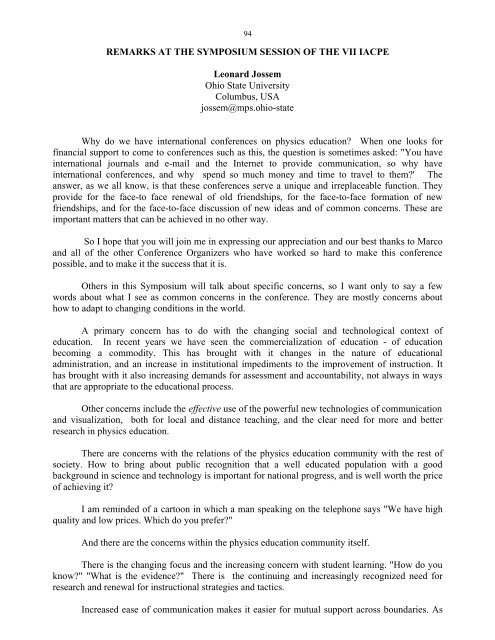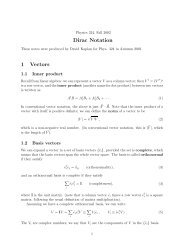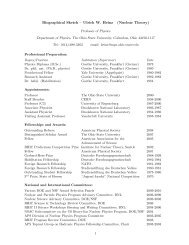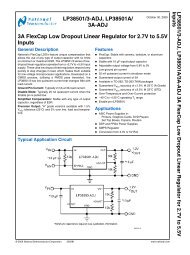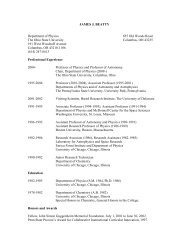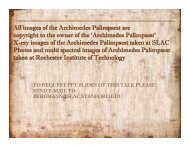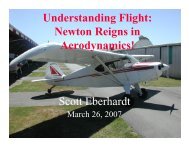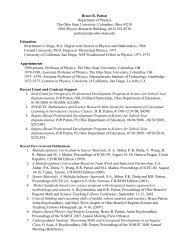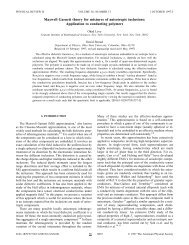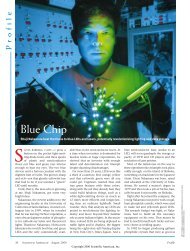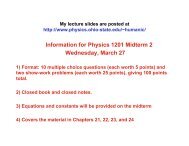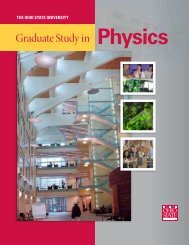Brasil Final Report - Department of Physics - The Ohio State University
Brasil Final Report - Department of Physics - The Ohio State University
Brasil Final Report - Department of Physics - The Ohio State University
Create successful ePaper yourself
Turn your PDF publications into a flip-book with our unique Google optimized e-Paper software.
94<br />
REMARKS AT THE SYMPOSIUM SESSION OF THE VII IACPE<br />
Leonard Jossem<br />
<strong>Ohio</strong> <strong>State</strong> <strong>University</strong><br />
Columbus, USA<br />
jossem@mps.ohio-state<br />
Why do we have international conferences on physics education? When one looks for<br />
financial support to come to conferences such as this, the question is sometimes asked: "You have<br />
international journals and e-mail and the Internet to provide communication, so why have<br />
international conferences, and why spend so much money and time to travel to them?' <strong>The</strong><br />
answer, as we all know, is that these conferences serve a unique and irreplaceable function. <strong>The</strong>y<br />
provide for the face-to face renewal <strong>of</strong> old friendships, for the face-to-face formation <strong>of</strong> new<br />
friendships, and for the face-to-face discussion <strong>of</strong> new ideas and <strong>of</strong> common concerns. <strong>The</strong>se are<br />
important matters that can be achieved in no other way.<br />
So I hope that you will join me in expressing our appreciation and our best thanks to Marco<br />
and all <strong>of</strong> the other Conference Organizers who have worked so hard to make this conference<br />
possible, and to make it the success that it is.<br />
Others in this Symposium will talk about specific concerns, so I want only to say a few<br />
words about what I see as common concerns in the conference. <strong>The</strong>y are mostly concerns about<br />
how to adapt to changing conditions in the world.<br />
A primary concern has to do with the changing social and technological context <strong>of</strong><br />
education. In recent years we have seen the commercialization <strong>of</strong> education - <strong>of</strong> education<br />
becoming a commodity. This has brought with it changes in the nature <strong>of</strong> educational<br />
administration, and an increase in institutional impediments to the improvement <strong>of</strong> instruction. It<br />
has brought with it also increasing demands for assessment and accountability, not always in ways<br />
that are appropriate to the educational process.<br />
Other concerns include the effective use <strong>of</strong> the powerful new technologies <strong>of</strong> communication<br />
and visualization, both for local and distance teaching, and the clear need for more and better<br />
research in physics education.<br />
<strong>The</strong>re are concerns with the relations <strong>of</strong> the physics education community with the rest <strong>of</strong><br />
society. How to bring about public recognition that a well educated population with a good<br />
background in science and technology is important for national progress, and is well worth the price<br />
<strong>of</strong> achieving it?<br />
I am reminded <strong>of</strong> a cartoon in which a man speaking on the telephone says "We have high<br />
quality and low prices. Which do you prefer?"<br />
And there are the concerns within the physics education community itself.<br />
<strong>The</strong>re is the changing focus and the increasing concern with student learning. "How do you<br />
know?" "What is the evidence?" <strong>The</strong>re is the continuing and increasingly recognized need for<br />
research and renewal for instructional strategies and tactics.<br />
Increased ease <strong>of</strong> communication makes it easier for mutual support across boundaries. As


